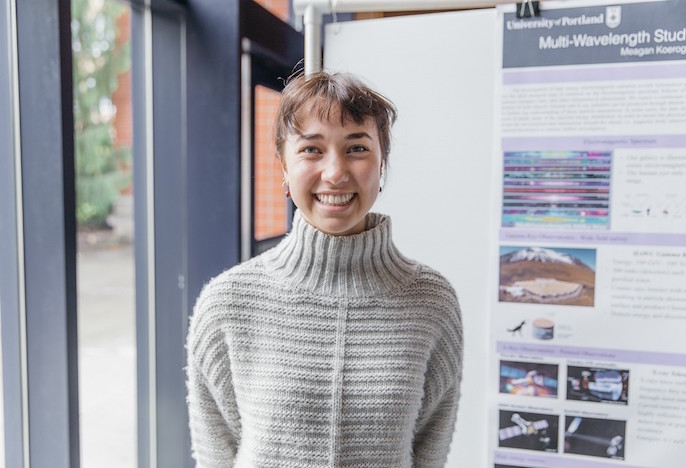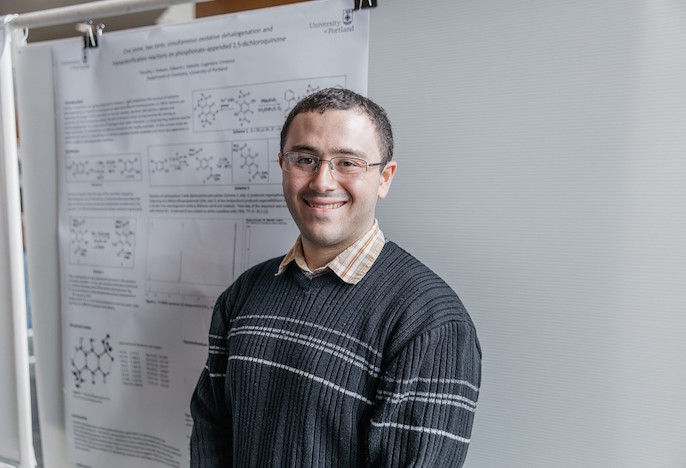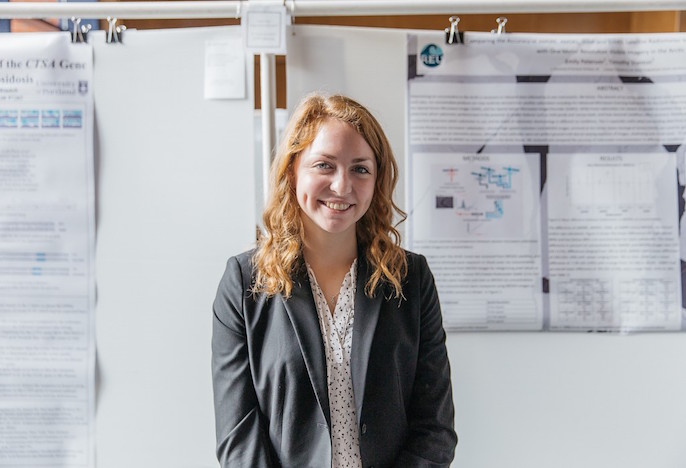
Each fall semester the Office of Undergraduate Scholarly Engagement invites students and faculty from all UP disciplines to share findings of research projects conducted the previous summer, both on the UP campus and around the nation. Submissions open in September and are due by mid-October each year to participate via the online Portlet.
Sign-up to present your poster here!
The Portlet to submit posters for the 2025 UGR Symposium is open and will close on Friday October 17th. Any requests for poster spots after October 17th will only be granted as space allows.

Junior physics major Meagan Koeroghlian spent summer 2016 completing a 10-week National Aeronautics and Space Administration (NASA) Internship at the NASA Marshall Space Flight Center in Huntsville, Alabama. Her project, titled “Multiwavelength Study of the High Energy Universe,” focused on high-energy astrophysics.
“I was very lucky to get placed in a group that performed research on high energy astrophysics. I have always been interested in astronomy, so I was really excited to experience what a research career in this field would be like. The NASA internship provided a stipend for travel and living expenses, and required me to present my work with a poster and oral presentation … It was a bit like being thrown into the deep end of the swimming pool. However, it provided me the chance to learn a lot about a topic that I'd always been curious about. It gave me a peek into this incredible world where people studying a wide range of topics can come together and further our understanding of the universe.” -Koeroghlian

Senior chemistry major Timothy Dobson took part in UP’s College of Arts and Sciences Summer Research Program, working on a 10-week inorganic chemistry project with UP science professor Eugene Urnezius. His research subject was “Simultaneous oxidative dehalogenation and transesterification reactions on phosphonate appended 2,5-dichloroquinone.”
“Dr. Urnezius taught me that going into a research project, you have to accept that you are going to fail. You can go on for days, subjecting yourself to the drudgery of trying to get something to work, but to no avail. Then finally something does work, maybe even in a way you didn’t expect, and suddenly all the attempts that came up short have meaning. There have been many times I have been in the lab by myself, smiling, because my efforts bore fruit … When you are presented with seemingly infinite questions and possibilities, you have to prioritize and ask which questions you are best equipped to answer and which seem the most promising. I’m graduating this spring and I have learned to love doing research. I hope to return to graduate school in a couple of years. For now, my plan is to work in an industry where I can continue learning new skills and explore new areas of chemistry so that when I return to graduate school I can be passionate about my work.” -Dobson

Sophomore computer science and mathematics major Emily Peterson presented “Comparing the Accuracy of AMSRE, AMSR2, SSMI and SSMIS Satellite Radiometer Ice Concentration Products with One-Meter Resolution Visible Imagery in the Arctic.” She conducted her research as part of the National Science Foundation Monterey Bay Regional Ocean Science Research Experience for Undergraduate program in the area of polar oceanography.
“I have had a lifelong fascination with water and was interested in ocean research combined with computer science. The Research Experience for Undergraduates (REU) program I took part in was able to place me in an oceanography lab where my computer science skills were helpful in polar oceanography. My mentor, Tim Stanton at the Naval Postgraduate School, taught me the importance of determination, problem solving, and knowing when to get help. I was expected to work hard to complete my project, and needed to be creative in how I found solutions to the numerous problems which came up … I hope to use the next two summers to explore more research opportunities and career options in the technology field. I am strongly considering graduate school after I leave UP, potentially in the oceanography field.” -Peterson